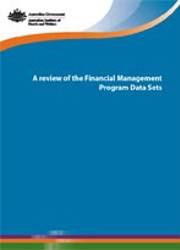Summary
This document describes the work undertaken by the Australian Institute of Health and Welfare‘s (AIHW) METeOR and Metadata Unit (MMU) to review and develop specifications for an improved data collection for the FaHCSIA Financial Management Program (FMP).
The report is intended to assist FaHCSIA to develop a new FMP data collection. It forms part of a broad review of the suite of FMP services and provides the specifications for a new FMP data set. The new data set has been developed by undertaking a review of data requirements and consulting a sample of FMP providers, peak bodies and FaHCSIA staff.
The 'in-scope' activities of the new data set are the currently collected Emergency Relief (ER), Commonwealth Financial Counselling (CFC) and Money Management services (MM). These services are provided free to people who are experiencing financial stress or are at risk of financial stress. The majority of these services are delivered through community service and/or welfare organisations.
A significant objective of this project has been to reduce the data collection burden currently imposed on service providers. This project has also sought to improve the relevance and usefulness of data collected by FAHCSIA.
This report outlines the data development processes and principals adopted by the data development team during the construction of the new data set. It also documents the research process, research findings and provides recommendations on:
- which providers should be in scope for the data set
- which clients/services should be in scope for the data set if funding is obtained through multiple sources
- how the data should be reported by providers to FaHCSIA
- how the data should be reported back by FaHCSIA to providers
- the frequency of reporting periods
- the data items to be collected as part of the data set.
The report includes full metadata for the data items, and follows the approach used in FaHCSIA‘s Minimum Standard Client Data Set.
The report contains a number of recommendations regarding changes to the current reporting requirements.
It also contains some suggested collection tools (in Section 6.2). These have been developed to promote discussions between FaHCSIA and various stakeholders. Further development and consultation with stakeholders is likely to be necessary before they can be implemented.
Governance and process recommendations
Recommendation 1: Governance arrangements for data collection methodologies and change processes should be put in place in line with those described in Section 5 of this report. This includes appropriate lead times for development and exposure of new data standards and including service providers in the process of adding new data items. It is recommended that about 6 months lead time be given to providers to allow them to make necessary systems changes.
Recommendation 2: FaHCSIA should adopt the data development principles described in Section 2 as standard practice for any future development of data relating to the FMP.
Recommendation 3: FAHCSIA should establish a working group with representative membership from all of the stakeholders, including Australian Government, state and territory government representatives, non-government organisations (including service providers) and peak bodies to advance work on the National Minimum Data Sets and to determine any future changes to the data collection program and data definitions.
Recommendation 4: Develop a feedback loop for providers at the national level that provides information about the FMP and its attendant data collections via a series of newsletters, forums, or personal visits.
Recommendation 5: Develop and make available to the public data reports on the number and types of service delivered by the FMP. This should include a clear link between policy directives and the data collected to support the provision, planning and performance of the FMP sector.
Data collection and data dictionary recommendations
Recommendation 6: Adopt the data standards and their definitions as defined in Section 6 of this report (The Financial Management Program Data Dictionary) for use in both the data collection forms and data collection manuals. This includes adopting existing national data standards that have already been endorsed by the community services sector where appropriate.
Recommendation 7: Adopt the National Minimum Data Set Specifications for ER as specified in Section 6 of this report, and introduce a reduced cut-off of $20,000 for small ER organisations.
Recommendation 8 and 9: Adopt the National Minimum Data Set Specifications for CFC (Recommendation 8) and MM (Recommendation 9) as specified in Section 6 of this report, and remove the regular collection of the qualitative data items. A number of the qualitative items can be easily altered to become quantitative items and, where appropriate, these have been have been included in the data dictionary.
Recommendation 10: Prepare an annual qualitative questionnaire to obtain the ‗good news stories‘ and other narrative components of the current FMP data collections. Future developments
Recommendation 11: Agree to support the use of electronic client management systems to capture information at the client level which would give service providers the capability to record data once, and from which reports could be generated to support aggregate collection.



